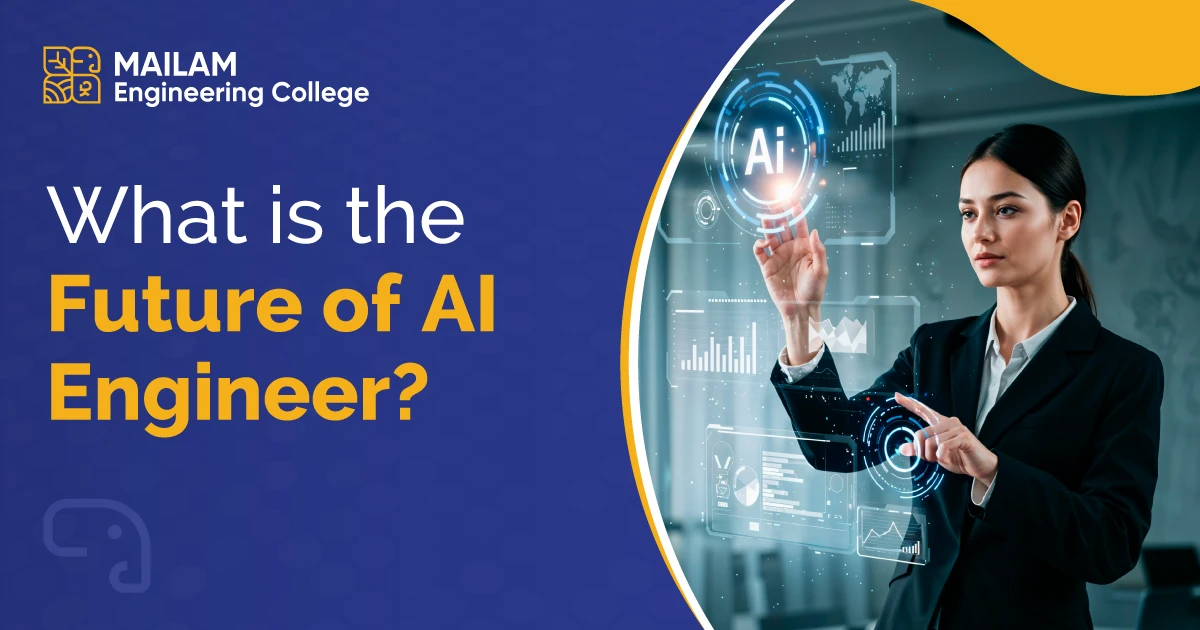From voice assistants to self-driving cars, artificial intelligence (AI) is the present. But behind every AI innovation is a human architect: the AI Engineer. As we move into a hyper digital era, the question is: what is the future of AI engineer?
In this blog, we’ll explore how the role of AI engineers is expanding, the skills needed to thrive, the industries that are driving demand, and what aspiring students should know if they want to ride this wave.
Who Is an AI Engineer?
Before diving into the future, let’s first understand what an AI engineer does. At the core, an AI engineer is responsible for designing, developing, deploying, and maintaining AI systems. These professionals work with machine learning (ML), deep learning, natural language processing (NLP), and neural networks to create intelligent applications that mimic human behaviour.
Their work ranges from developing recommendation engines for streaming platforms to building computer vision models for healthcare diagnostics. With this wide scope of application, AI engineers serve as the technical backbone of next generation software.
Why Is the Future of AI Engineer So Promising?
The future of AI engineer is incredibly promising, driven by several global trends that are reshaping how businesses and societies function.
A) Data Explosion:
Every day, the world generates over 2.5 quintillion bytes of data. This vast pool holds untapped insights, and AI engineers are key to building systems that can analyse, interpret, and extract value from this information in real-time.
B) Automation Drive:
Organisations across all sectors are adopting automation to improve efficiency and reduce costs. From manufacturing to customer service, AI engineers are at the centre of creating intelligent systems that replace repetitive tasks with smart workflows.
C) Technological Advancements:
Innovations in computing, especially the rise of powerful GPUs, cloud infrastructure, and even quantum computing, have made it possible to develop more advanced AI models. These tools allow engineers to build solutions that were unimaginable just a few years ago.
Because of these shifts, the role of AI engineers extends far beyond the tech industry. The future of AI engineer will impact nearly every domain. This makes AI engineering one of the most versatile and guaranteed careers available today.
Top Industries Shaping the Future of AI Engineer
Let’s look at the key industries that are reshaping the landscape for AI professionals:
1. Healthcare
AI engineers are playing a major role in predictive diagnostics, personalised medicine, robotic surgery, and drug discovery. With AI’s ability to analyse patient data quickly and accurately, the future of AI engineer in healthcare is both impactful and lifesaving.
2. Finance
AI powers fraud detection, risk management, algorithmic trading, and chatbots in financial services. Engineers are crucial in designing models that handle sensitive financial data with accuracy and speed.
3. Automobile
With autonomous vehicles, the automotive industry is perhaps the most visible area showcasing the future of AI engineer. From Tesla’s autopilot to AI traffic systems, engineers in this field will literally drive the future.
4. Retail and E-commerce
From customer behaviour prediction to smart inventory management, AI engineers help optimise supply chains and user experience.
5. Manufacturing
Industry 4.0 is already here. Smart factories, powered by AI and IoT, need engineers to build systems that can detect faults, predict maintenance needs, and ensure seamless production.
Skills That Define the Future of AI Engineer
Being an AI engineer requires more than just coding skills. The role is multidisciplinary and demands a broad skillset:
1. Programming Proficiency
AI engineers must be fluent in languages like Python, R, and Java. Familiarity with powerful libraries such as TensorFlow, PyTorch, and Keras enables efficient development of AI models.
2. Mathematics & Statistics
A solid grasp of linear algebra, calculus, probability, and statistics forms the core of machine learning. These concepts help in algorithm design and optimisation.
3. Machine Learning and Deep Learning
Understanding a range of algorithms, including regression, classification, clustering, and neural networks (CNNs, RNNs, GANs), is vital. These models form the core of AI systems.
4. Data Handling
AI engineers must be adept at cleaning, processing, and visualising large datasets. This ensures accurate training and reliable model outcomes.
5. Natural Language Processing (NLP)
With the growing use of chatbots and language models, NLP is now a crucial skill. It enables machines to understand and generate human language effectively.
6. Cloud and DevOps
Modern AI systems often rely on cloud platforms like AWS, Azure, or GCP. Engineers need to know how to deploy and scale models using DevOps tools.
7. Ethics and Explainability
As AI becomes more integrated into critical decisions, understanding fairness, bias, and model transparency is key. The future of AI engineer depends on building systems that people can trust.
Emerging Roles in AI Engineering
As the field matures, new specialisations are emerging that will define the future of AI engineer:
- AI Architect – Designs the overall AI systems and infrastructure.
- Machine Learning Ops (MLOps) Engineer – Ensures that models are deployed, monitored, and updated effectively.
- Prompt Engineer – Optimises inputs to large language models like ChatGPT for specific outputs.
- Data Annotation Specialist – Prepares and labels data for supervised learning.
- Explainable AI (XAI) Analyst – Focuses on transparency in AI decision-making.
These roles are reshaping job descriptions and offer high paying opportunities across sectors.
The Future of AI Engineer: What’s Next?
So, what does the next decade hold for this career path?
1. Wider Adoption
AI will no longer be a “nice-to-have” but a “must-have” across sectors. This means AI engineers will become as common and essential as software developers.
2. More Regulation
As AI begins making decisions in critical sectors like law, healthcare, and defence, regulatory bodies will step in. The future of AI engineer will include compliance, bias checking, and documentation.
3. Increased Focus on AI Ethics
There will be more concentration on fairness, accountability, and social impact. Engineers will need to understand ethical frameworks and ensure AI does not propagate bias.
4. AI in Daily Life
AI engineers will develop systems that interact seamlessly with humans in daily life, from smart kitchens to personal AI tutors.
5. Collaborative AI
We’re moving toward human-AI collaboration. The future of AI engineer will involve designing systems that augment, not replace, human intelligence.
Future of AI Engineer vs Other IT Careers
Let’s compare how the future of AI engineer stacks up against other popular tech roles:
| Role | Growth Potential | Average Salary | Demand Across Industries |
| AI Engineer | Very High | ₹12 – 30 LPA | Healthcare, Finance, Auto |
| Web Developer | Moderate | ₹4 – 8 LPA | E-commerce, Media |
| DevOps Engineer | High | ₹8 – 18 LPA | Tech, SaaS, Cloud |
| Data Analyst | High | ₹5 – 10 LPA | Retail, Marketing |
| Software Tester | Moderate | ₹3 – 6 LPA | All industries |
Clearly, the future of AI engineer is among the most lucrative and diverse.
Challenges That Come with the Future of AI Engineer:
No field is without challenges, and AI engineering is no different:
1. Rapid Technological Changes
Keeping up with the evolving scene can be overwhelming.
2. Ethical Dilemmas
Decisions about surveillance, privacy, and bias can create moral tension.
3. Data Security
AI systems often require vast data inputs, leading to concerns around data breaches and misuse.
4. Interdisciplinary Nature
The field requires knowledge of multiple domains from psychology to neuroscience, making the learning curve steep.
Despite these challenges, the future of AI engineer remains solid and rewarding for those who are willing to adapt and grow.
How to Prepare for the Future of AI Engineer
Here’s a roadmap for students and early career professionals to prepare:
- Learn Python & R
- Master Machine Learning and Deep Learning
- Get practical with Projects
- Contribute to Open Source
- Build a Portfolio
- Pursue Internships
- Stay Updated with AI Trends
- Join AI Communities
- Earn Relevant Certifications
- Choose the Right College (like Mailam!)
Opportunities for Students: Start at Mailam Engineering College
At Mailam Engineering College, students are already being equipped with the skills needed for the future of AI engineer. The institution offers a robust curriculum in Computer Science and Engineering with electives in AI, ML, and data science. Practical exposure through interactive labs, coding competitions and clubs helps students build real world capabilities.
Moreover, our college organises seminars, workshops, and tech fests that bring industry experts to campus, offering insights into the future of AI engineer careers. For aspiring engineers, Mailam is a launchpad for high impact careers.
Final Thoughts
The world is being rewritten in code, and AI engineers are the new authors. As industries across the globe transition into intelligent ecosystems, the future of AI engineer will define how humans work, learn, travel, shop, and even heal.
If you’re a student wondering what field will be both foreseeable and fulfilling, the path of an AI engineer stands tall. With the right guidance, training, and vision, you can be the force shaping tomorrow’s intelligent world.
FAQs
1) What is the future of AI engineer in the next 10 years?
AI engineers will become essential across all sectors, including healthcare, finance, and education, designing systems that work alongside humans and improve life quality.
2) How much does an AI engineer earn in India?
Entry level salaries start at ₹10 LPA and can go beyond ₹30 LPA with experience and specialisation.
3) Can students from non-CS backgrounds become AI engineers?
Yes, with the right skills and certifications, even graduates from math, physics, or electronics backgrounds can enter the field.
4) Is AI engineering a safe long-term career?
Absolutely. With digital transformation at the forefront, the demand for AI engineers is expected to grow consistently.
5) Where can I study AI engineering in Tamil Nadu?
Mailam Engineering College is one of the promising institutions offering AI courses and infrastructure for aspiring engineers.







